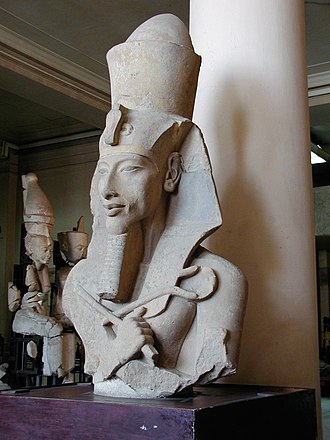Akhenaten, the ancient Egyptian king disputed, archaeologists of his glory and said that he may be the same Imran, the father of the Virgin Mary, the
Akhenaten, the ancient Egyptian king disputed, archaeologists of his glory and said that he may be the same Imran, the father of the Virgin Mary, the mother of Jesus Christ, son of Mary, peace be upon him. However, some archaeologists call him the rogue pharaoh who scattered thought and divided worship between Aton and Amun. I wonder who Akhenaten really is?
اخناتون الملك المصرى القديم المختَلَفْ عليه, من علماء الأثار من مجدوه وقالوا انه ربما يكون هو ذاته عمران والد السيدة مريم العذراء ام المسيح عيسى ابن مريم عليه السلام . غير ان بعض علماء الأثار يسمونه الفرعون المارق الذى شتت الفكر وقسم العباده بين اتون و امون. ياترى من يكون اخناتون فى الحقيقة؟
Akhenaten, also famous as Amenhotep IV, was an ancient Egyptian pharaoh’s reigned during the 18th Dynasty. He is primarily remembered for his religious reforms, which centered around the worship of the sun god Aten to the exclusion of other deities. While there are no surviving supplications or prayers directly attributed to Akhenaten, the hymns discovered in the city of Amarna provide insights into the monotheistic religious beliefs of his reign.

Here is an example of a poetic supplication inspired by Akhenaten’s religious ideology:
Themes of Akhenaten’s Prayers:
- Hymns to the Aten: The Aten, the sun disc, was the sole deity in Akhenaten’s religion. Prayers would likely express praise, gratitude, and reverence for the Aten’s life-giving power and beauty.
- Focus on Light and Creation: Akhenaten associated the Aten with light and life-giving force. Prayers might involve metaphors of light, darkness, and rebirth, celebrating the Aten’s creation of the world and mankind.
- Pharaoh as Intermediary: As the Aten’s son, Akhenaten played a key role in mediating between the deity and his people. Prayers might involve him acting as a conduit for offerings and petitions, seeking blessings and favor for the land and its inhabitants.
- Ethical and Moral Aspects: Atenism emphasized truth, justice, and compassion. Prayers could reflect these values, seeking guidance and strength to uphold Maat (cosmic order) and lead a righteous life.
- “O radiant Aten, creator of life, your rays kiss the earth, bringing warmth and joy. We raise our hands in gratitude for your light, the source of all existence.”
Some other themes of Akhenaten’s Prayers:
- “From the darkness you rise, banishing shadows with your golden touch. You grant sight to the blind and life to the lifeless. May your light forever shine upon us, O Aten, and guide us on the path of Maat.”
- “As your loyal son, I stand before you, O Aten, a bridge between your divine power and your beloved people. Hear their pleas, accept their offerings, and shower them with your blessings. May harmony and justice reign in your name.”
- “Grant me wisdom, O Aten, to rule with compassion and truth. Let my heart be a mirror reflecting your light, leading the people towards righteousness and prosperity.”
These are just examples, and the actual supplications and prayers of Akhenaten could have been more diverse and complex. Remember, our understanding of his religious practices is still evolving based on ongoing research and discoveries.
I hope this information gives you a better understanding of Akhenaten’s likely prayers and the themes that might have been present in them.
For part 2 of “Akhenaten-Supplications and Prayers for Aton” Part 2
For more information about Egypt please visit the next links!
Egypt-Enduring Marvels: Unveiling the Secrets of the Pyramids
Giza-Egypt: Wonders of the Ancient World
Thanks for reading.

COMMENTS